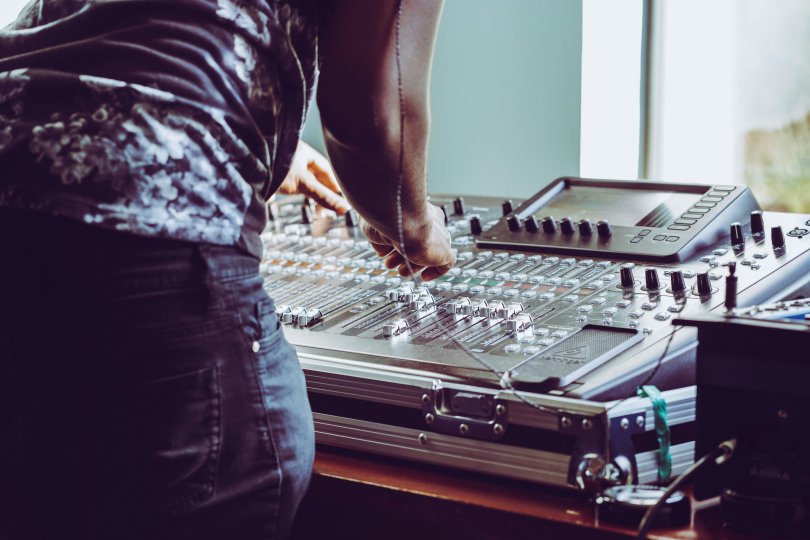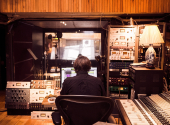
5 Things I’d Say to my Beginner Studio Sound Engineer Self
We've all wondered what it would be like to go back in time and start our careers all over again. But this time, we have all the experience we've gained along the way. What would we have done differently? I asked myself that very question and wrote down five things I’d say to my beginner self.
It's not just technical advice; it's also suggestions on how to make decisions, overcome tough moments, and not get discouraged. This experience can guide moving forward with more confidence and a better understanding of what is really important.
1. Be patient and resilient
"I know you want everything now. I was the same. I wanted to make great records as soon as possible, work on cool projects with the biggest stars in the music scene. But sound engineering is not a race. It's a constant learning process, just like learning to play a musical instrument.
In the beginning, you'll doubt yourself – you'll tell yourself that you're not good enough, that you don't have the right equipment, that everyone around you is better and faster. You might even wonder if there's any point in doing it. But trust me – there is, it's a great job. It's just gonna take time. A long time. It takes time to get better, to learn to use the gear, to train your ear, to build a clientele. But most importantly, it takes time to refine your taste, because, at least in my opinion, without a developed sense of taste, a person is bound to drift aimlessly.
And it's not just patience – you'll have to work at it. Work hard and do as many projects as you can so that you can make lots of mistakes and therefore learn quickly. Try to record different genres, meet as many people as you can, and figure out what you're most passionate about and where your strengths lie. In the beginning, quantity was more important than quality. Don't wait for ideal conditions. Work with what you've got, and most importantly, start now.
Also, go to gigs, don't be stuck in the studio all the time. Listen to your parents – but most importantly, listen to music! Variety, not your Bach, Beethoven and Nightwish. You're too young to be stuck in one genre. There's so much great music being made in the world. But listen actively, don't consume, think about the music, why it sounds the way it does."
2. The truth about business
"It looks nice, doesn't it, to be a freelancer. No boss, no corporation, you can get up at whatever time you want, work only on interesting projects, have freedom in scheduling, take time off whenever you want. But the reality's going to be a little different. You'll be in the studio for ten to twelve hours a day. Do you know when musicians like to record the most? Weekends. So forget about weekends spent with your family.
No sick days, no paid vacations. Anytime off? Sure, but if you're not working, you're not making money. Lots of uncertainty, constant investment in equipment, pressure to maintain quality. Endless learning. It's going to take mental toughness and the ability to be able to organise your time and work well.
On top of it, you'll have to figure out where to get more work. It's not just about knowing how to mix or record. You'll also be taking the work home with you, there's no other way to do it. It's so personal and it touches your soul so much that you carry your work with you in your head all the time. It’s not that easy to walk out of the studio and leave it all behind.
So, if you want to take this path, be prepared – it won’t be easy. But if you learn how to handle it, it’ll be amazing and bring you a lot of joy, benefits and a kind of freedom most people don’t have."
3. Mix is not as important as it seems
"I know you're always watching different tutorials on YouTube, dozens of videos on how to mix drums, how to mix guitars, what are the best plugins for this, what are the best plugins for that. Then it's easy to fall into the illusion that mixing and mastering are the main things that make a record great. But the truth is that the recorded material is absolutely crucial. And if you find a great band with great songs, mixing and mastering will be much easier.
Learning to mix is much easier (and cheaper) than recording. All you need are headphones and a laptop. You can do it at home in your room at night, you don't need anyone to do it. There are thousands of tutorials and videos on how to mix a song. But recording live musicians well is an art that takes time, experience and attention to detail.
So don't spend thousands on plugins, instead, invest in microphones and good musical instruments that you can lend to the musicians and learn how to record them. Record as many genres of music as you can. Build a library of ideal-sounding recordings in your head so you know what a well-recorded drum kit sounds like, what a well-recorded acoustic guitar sounds like. Don't waste time comparing dozens of microphones; get one and learn how to work with it. The same goes for studio monitors, headphones, etc."
4. Go practice the piano more and don’t spend so much time playing computer games
"I understand that you don't enjoy playing scales and etudes, but someday you'll regret that you could have learned piano for free from great professors and didn't take advantage of it. Piano isn't just about playing a few songs, it's an instrument that opens the door to musical understanding, composition and other complex things like sound synthesis and midi. Synths are going to permeate all genres and just recording acoustic instruments won't do. If you don't pursue it, in a few years, you'll find that it starts to limit you. You'll increasingly want to produce music too, working with virtual instruments, with samplers and sequencers.
I don't want to be like your mom, but if you're spending so much time on computer games, you should start looking at what kind of music and sounds they contain. The gaming industry is growing at an incredible rate, and one day, it will be huge. Music and sound are key in games, and this area can give you a great opportunity to exercise your creativity. If you take an interest in this world now, you'll find that there are plenty of opportunities to make your own way in it."
5. Every instrument in a recording doesn't have to have a perfect sound
"You're going to feel like you're being asked to make every instrument sound perfect in a recording, sound crystal clear, big, clear, noise-free, just a polished diamond. But that's not a good way to go. In music, it's not important that everything sounds perfect. On the contrary, often the "imperfect" can be exactly what gives a recording its character and what triggers different emotions in people.
Focus more on the texture of the sound than on its perfection. Think about transients, think about timbres, think about distortion, think about spaces. What's important is that your recording evokes some kind of reaction in people. It's not about making everything sound as good as possible but making it sound interesting. The "cleanest" version is not always the best. It's much more important if the recording catches your attention, if it conveys a certain emotion or mood. Always ask yourself what you want to say with the sound and what you want the listener to feel. Instead of always looking for perfection, focus on what gives the record life."
And what about you? What would you say to your younger self at the start of your career, whether as a musician, producer, or sound engineer?
If you have found an error or typo in the article, please let us know by e-mail info@insounder.org.





